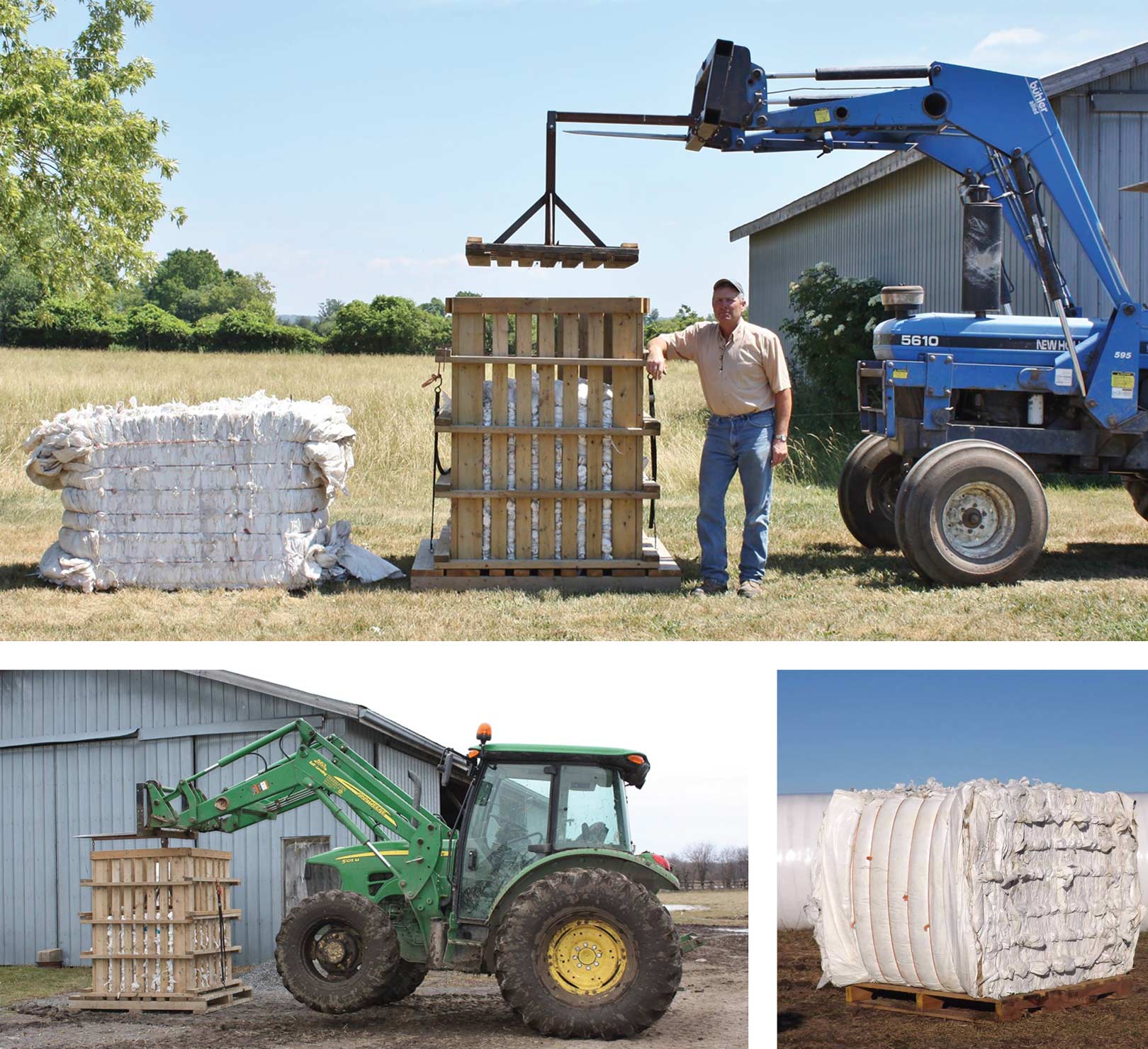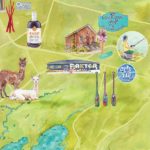
Single-use plastics like checkout bags, cutlery, and takeout containers are on their way out. Canada’s ban, which started to take effect last December, means that these familiar items will soon disappear. But what about the plastics used in Canada’s agriculture industry? According to Cleanfarms, a national agricultural industry stewardship organization, Canada produces just under 62,000 tonnes of agricultural plastic per year.
Prince Edward County beef farmer Lynn Leavitt’s interest in single-use farm plastics began about 13 years ago as a “hobby that got out of control,” he says with a chuckle. Like most farmers, he used a “fair bit” of bale wrap. This is the white plastic wrap used on round hay bales. The plastic wrap, which makes the round bales look like giant marshmallows lying in a farm field, allows the hay inside to ferment, essentially doing the same work as a silo.
Back in 2010, Leavitt was nominated to a four county Federation of Agriculture committee that was looking into recycling solutions for used plastic bale wrap. At the time, there was no place for it to go and it wasn’t part of any larger recycling program.
The committee connected with Loyalist College, bale wrap manufacturers Berry Plastics (based in Belleville) and municipal leaders to discuss options. “When you factored in the people, the process, and the price, it became clear that it needed to start at the farm.” Leavitt stresses that it is at the farm level where the integrity of the plastic must be maintained “so the processors can actually do something with it and get some value out of it.”
“Lynn’s commitment to finding a better way to manage used bale wrap demonstrates the difference one farmer can make.” KIM TIMMER, CLEANFARMS
A couple of years later, Leavitt set up a collection bin at this farm and held a two-day drop-in event for farmers to bring their used bale wrap for recycling. They filled a large bin that was about 12 feet long, 6 feet deep and 8 feet wide. He then compressed the plastic in the bin with his tractor. When he took it to the recycling plant, it popped out as a perfectly formed cube. “That’s what really inspired me. I knew every farmer had a tractor and we just needed to think about how we could compress the plastic in a cheap way.”
Lynn describes waking up one morning with the idea of a wooden compactor to hold the used bale wrap. He built a prototype using materials he found in his workshop. “The first one I built was very basic, but it worked well. We’ve refined it since then. It was really built after the idea of a big square baler standing on its end and using the weight of the tractor as the plunger to compress it. You tie it off with strings.”
Leavitt started his compactor business in 2016, calling it U-Pac Agri Service with a mission of “building a greener future one bale at a time.” His longer-term vision was to see all the plastic on Ontario farms compacted and sitting on pallets ready to be reprocessed by a recycling facility. Leavitt builds his wooden compactor units and sells them to farmers, who are responsible for removing the bale wrap off each hay bale, allowing it to dry and shaking particles of mud and forage off it, then loading it into the compactor and compressing it with a tractor until it’s full. The material is tied off and the wooden compactor is lifted off the plastic bale.
Of course, there was some skepticism early on when Leavitt approached local farmers with his compactors. They were interested in getting rid of their plastic waste, but they wanted to know where it was going.
What Leavitt quickly realized is that plastics recycling facilities are only interested in large and consistent supplies of commodities. He managed to secure a London, Ontario-based processor who drives to the County, picks up the recycled plastic bales and delivers them to the plant. Leavitt generates one full trailer load of used bale wrap every year from participating farmers in Prince Edward County. That’s 45,000 pounds, or 45 bales, of plastic diverted from landfill. The processing plant shreds, washes, and pelletizes the material so it can be incorporated into a variety of new products. (A 2021 study showed that Canadian farms use over 30,000 tonnes of plastic bale wrap annually.)
Early on, Leavitt introduced his compactor concept to the Beef Farmers of Ontario which, in turn, shared it with Cleanfarms. After they made a visit to his farm, Leavitt says, “They caught my vision.”
Not only did Cleanfarms “catch his vision,” they became a critical partner and facilitated key introductions that resulted in his compactors being used in pilot projects in Northern Ontario and Quebec.
“Lynn’s commitment to finding a better way to manage used bale wrap demonstrates the difference one farmer can make,” says Cleanfarms’ Kim Timmer. “He turned his vision into a reality and now more than 200 Canadian farmers are benefitting from his baler system.
“Lynn’s U-Pac baler reduces transportation, baling, and other logistical costs for farmers and it has been a game changer for recycling bale wrap. It’s about more than the baler, though, as Lynn is so generous with his time. It seems he’s always willing to talk to farmers who want to bend his ear on this topic.”
Leavitt’s innovation and persistence has been noticed and rewarded. In 2016, U-Pac received the Premier’s Award for Agri-Food Innovation Excellence and in April 2022, U-Pac received Ontario Soil and Crop Improvement Association’s Don Hill Legacy Award for creative and innovative solutions to environmental challenges faced on the farm.
In the longer term, Lynn Leavitt would like to see used agricultural bale wrap living a new life as biofuel. “This is a more attractive concept than recycling,” he says. “We would use it for one season as bale wrap and the next year, we can – in theory – bale our hay with it in the tractor. To me, that’s truly sustainable. We could measure the net amount of energy we recover.”
Story by:
Jennifer Shea




